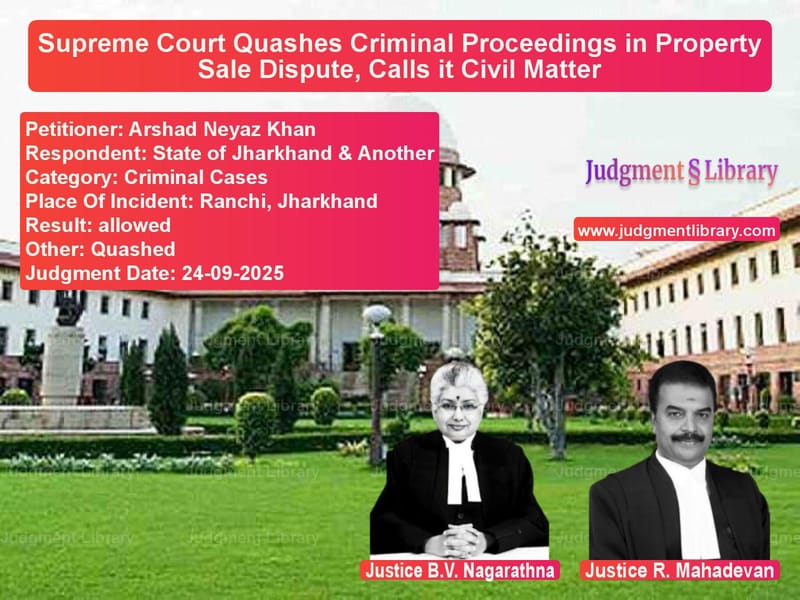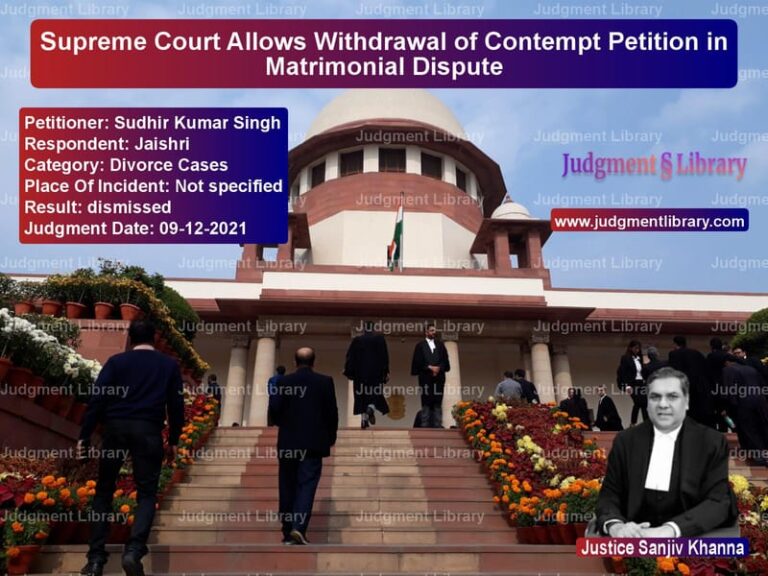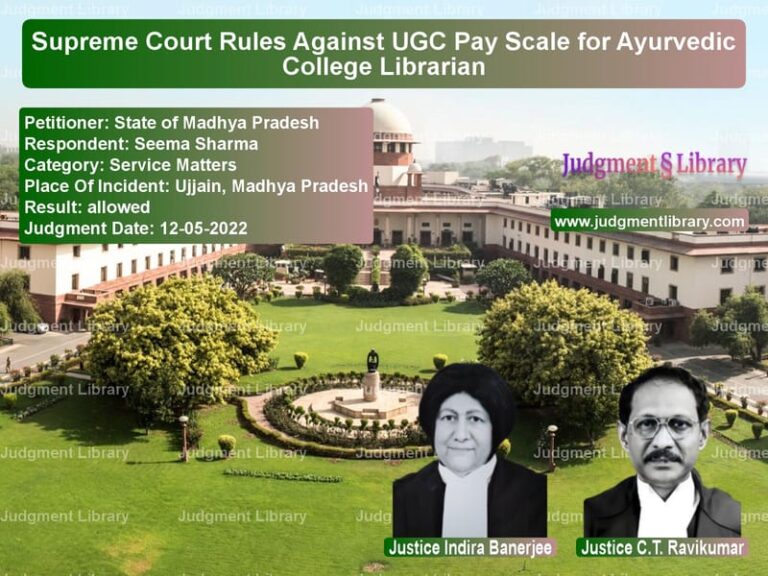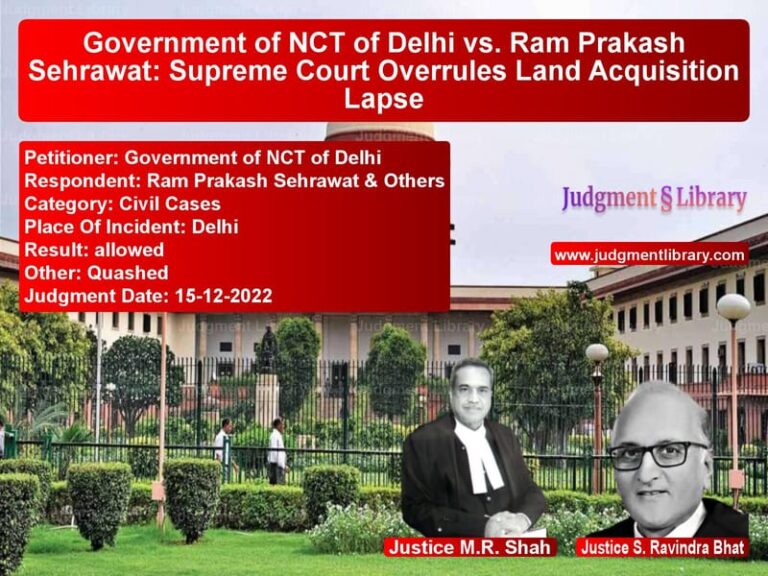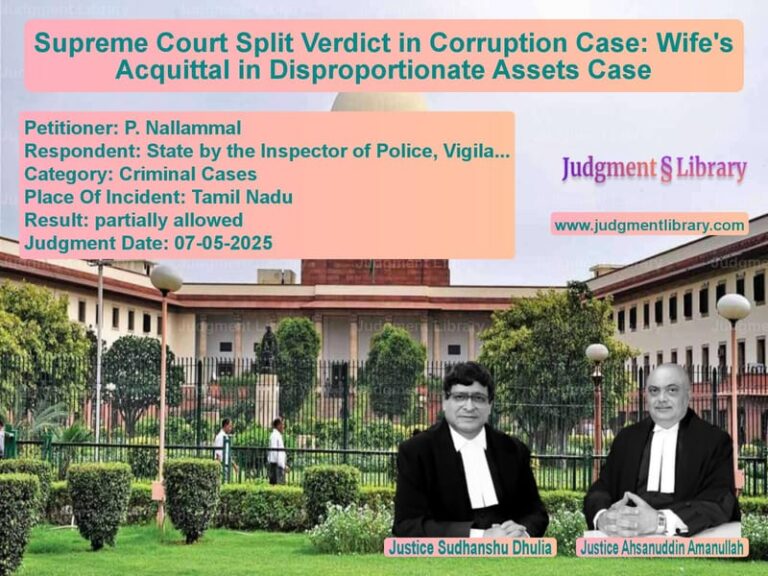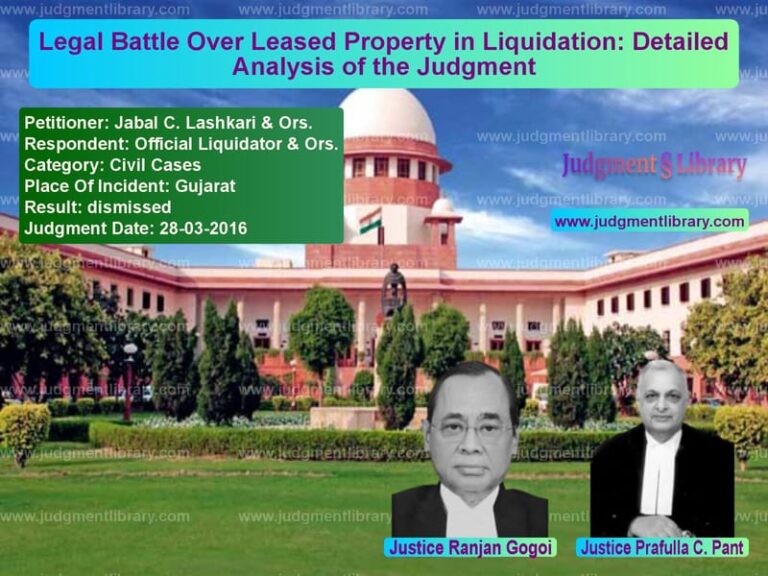Supreme Court Quashes Criminal Proceedings in Property Sale Dispute, Calls it Civil Matter
In a significant judgment that draws a clear line between civil disputes and criminal offenses, the Supreme Court of India has quashed criminal proceedings against a property owner accused of cheating and criminal breach of trust in a failed property transaction. The case involved Arshad Neyaz Khan, who had been facing criminal charges for nearly eight years over a property sale agreement that didn’t materialize.
The Property Deal That Went Wrong
The dispute began on February 16, 2013, when Arshad Neyaz Khan entered into a sale agreement for his properties with complainant Md. Mustafa for a total consideration of Rs. 43,00,000. The appellant received an advance payment of Rs. 20,00,000 on the date of the agreement. The properties in question were situated at Khata No. 186, MS Plot No. 1322, Sub Plot No. 1322/38-A, and an adjacent property for which Khan held power of attorney from six different owners.
According to the complainant, he was assured by Khan that all documents and titles to the properties were in order. After the agreement was signed and the advance payment made, Khan failed to transfer the properties to the complainant. The complainant also alleged that Khan didn’t return the money deposited with him.
The Criminal Complaint After Eight Years
What made this case particularly unusual was the timing of the complaint. Nearly eight years after the agreement for sale was signed, on January 29, 2021, the complainant filed Complaint Case No. 619 of 2021 alleging offenses under Sections 406 (criminal breach of trust), 420 (cheating), and 120B (criminal conspiracy) of the Indian Penal Code. This complaint led to the registration of FIR No. 18 of 2021 at Police Station Hindpiri against Khan.
Apprehending arrest, Khan filed an anticipatory bail application before the Judicial Commissioner, Ranchi on March 22, 2021. The parties were referred to mediation, where they reached a settlement agreement according to which Khan agreed to return Rs. 24,00,000 to the complainant in five installments as full and final settlement of all claims.
The Legal Battle Intensifies
The Judicial Commissioner granted anticipatory bail to Khan on December 23, 2021. However, when Khan failed to make timely payments as per the bail conditions, the complainant sought cancellation of the bail, which was granted on June 15, 2022. Khan then approached the Jharkhand High Court under Section 482 of CrPC seeking quashing of the FIR and criminal proceedings. The High Court partly allowed his petition on January 19, 2023, refusing to quash the criminal proceedings but allowing him to file a fresh anticipatory bail application. Aggrieved by this order, Khan approached the Supreme Court.
The Supreme Court’s Legal Analysis
The Supreme Court conducted a thorough examination of whether the allegations in the complaint and FIR actually constituted offenses under Sections 406 and 420 IPC. The Court referred to its landmark judgment in Inder Mohan Goswami vs. State of Uttaranchal, where it was observed: “To hold a person guilty of cheating it is necessary to show that he had a fraudulent or dishonest intention at the time of making the promise. From his mere failure to subsequently keep a promise, one cannot presume that he all along had a culpable intention to break the promise from the beginning.”
Read also: https://judgmentlibrary.com/supreme-court-quashes-rape-case-citing-vengeful-motive-and-legal-malice/
The Court made a crucial observation about the nature of the dispute: “We fail to understand as to how the allegations against the appellant herein could be brought within the scope and ambit of the aforesaid section. On a bare perusal of the FIR as well as the complaint, we do not find that the offence of cheating as defined under Section 420 IPC is made out and we do not find that there is any cheating and dishonest inducement to deliver any property or a valuable security involved in the instant case.”
No Evidence of Criminal Intent
The Court emphasized that for establishing the offense of cheating, the complainant needed to show that the appellant had a fraudulent or dishonest intention at the time of making the promise. The Court noted: “In the facts of the present case, there is a clear absence of dishonest and fraudulent intention on the part of the appellant during the agreement for sale. We must hasten to add that there is no allegation in the FIR or the complaint indicating either expressly or impliedly any intentional deception or fraudulent/ dishonest intention on the part of the appellant right from the time of making the promise or misrepresentation.”
The Court further observed that mere allegations that the appellant failed to execute the agreement for sale and failed to refund the money did not satisfy the test of dishonest inducement required under Section 420 IPC.
Analysis of Criminal Breach of Trust
Regarding the offense of criminal breach of trust under Section 406 IPC, the Court found that the complainant had failed to establish essential ingredients of the offense. The Court stated: “The complainant/respondent No.2 has failed to place any material on record to show us as to how he had entrusted property to the appellant. Furthermore, the complaint also omits to aver as to how the property, so entrusted to the appellant, was dishonestly misappropriated or converted for his own use, thereby committing a breach of trust.”
The Court made an important legal distinction: “This Court in Delhi Race Club (1940) Limited vs. State of Uttar Pradesh observed that there is a distinction between criminal breach of trust and cheating. For cheating, criminal intention is necessary at the time of making false or misleading representation i.e. since inception. In criminal breach of trust, mere proof of entrustment is sufficient. Thus, in case of criminal breach of trust, the offender is lawfully entrusted with the property, and he dishonestly misappropriates the same. Whereas, in case of cheating, the offender fraudulently or dishonestly induces a person by deceiving him to deliver a property. In such a situation, both offences cannot co-exist simultaneously.”
Suspicious Delay and Alternative Remedies
The Court took serious note of the eight-year delay in filing the complaint: “Learned counsel for the complainant/respondent No.2 has failed to impress the Court about the reason for the delay and hence this fact further raises a suspicion about the bona fides of the complainant/respondent No.2. The delay in lodging of the complaint and FIR, coupled with the vague allegations do not inspire any confidence in the Court to allow the criminal proceedings to continue against the appellant.”
The Court also noted that the complainant had an alternative remedy of filing a civil suit for damages for alleged violation of contractual rights, which he had not availed. The Court strongly stated: “Criminal law ought not to become a platform for initiation of vindictive proceedings to settle personal scores and vendettas.”
Application of Bhajan Lal Guidelines
The Court referred to the famous case of State of Haryana vs. Bhajan Lal, which laid down categories where courts can exercise their inherent powers to quash criminal proceedings. The Court found that several categories from the Bhajan Lal case applied to the present matter, particularly where allegations in the FIR, even if taken at face value, do not constitute any offense, and where proceedings are maliciously instituted with ulterior motives.
The Court expressed concern about the misuse of criminal justice machinery: “In recent years the machinery of criminal justice is being misused by certain persons for their vested interests and for achieving their oblique motives and agenda. Courts have therefore to be vigilant against such tendencies and ensure that acts of omission and commission having an adverse impact on the fabric of our society must be nipped in the bud.”
The Final Verdict
After comprehensive analysis, the Supreme Court set aside the High Court’s order and quashed Complaint Case No. 619/2021, FIR No. 18 of 2021, and all consequent proceedings. The Court allowed the appeal, bringing relief to the appellant who had been facing criminal proceedings for what the Court determined was essentially a civil dispute.
This judgment reinforces the principle that criminal law should not be used as a tool for settling civil disputes or for harassment. It emphasizes the importance of establishing criminal intent from the inception of a transaction to constitute offenses like cheating, and distinguishes between contractual breaches that belong to civil courts and criminal offenses that require proof of fraudulent intention from the beginning.
Petitioner Name: Arshad Neyaz Khan.Respondent Name: State of Jharkhand & Another.Judgment By: Justice B.V. Nagarathna, Justice R. Mahadevan.Place Of Incident: Ranchi, Jharkhand.Judgment Date: 24-09-2025.Result: allowed.
Don’t miss out on the full details! Download the complete judgment in PDF format below and gain valuable insights instantly!
Download Judgment: arshad-neyaz-khan-vs-state-of-jharkhand-&-supreme-court-of-india-judgment-dated-24-09-2025.pdf
Directly Download Judgment: Directly download this Judgment
See all petitions in Fraud and Forgery
See all petitions in Property Disputes
See all petitions in Contract Disputes
See all petitions in Bail and Anticipatory Bail
See all petitions in Judgment by B.V. Nagarathna
See all petitions in Judgment by R. Mahadevan
See all petitions in allowed
See all petitions in Quashed
See all petitions in supreme court of India judgments September 2025
See all petitions in 2025 judgments
See all posts in Criminal Cases Category
See all allowed petitions in Criminal Cases Category
See all Dismissed petitions in Criminal Cases Category
See all partially allowed petitions in Criminal Cases Category

